Early Years Literacy & Learning Resources
Start by using the filters on the left to help you find the resources and downloads that match your needs.
Hide Filters
No filters applied. Showing all results
Reset All
Sort By
Year Group 
Program 
Type 
Comprehension Questions for 4 Year Olds
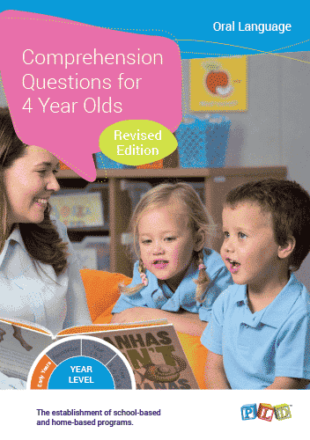
A home or school picture book program for 4 Year Old students.
Comprehension Questions for 4 Year Olds is a home or school resource designed to support oral language development in young children. From a young age, children should be verbal, actively engage in social interactions and understand simple, literal questions about their surroundings. By age 4, children begin answering more complex questions, requiring them to identify less obvious attributes, make predictions and sequence information. This program, developed by speech pathologists, supports the development of these foundational comprehension skills using engaging picture books to ask age-appropriate questions and assess oral responses. Oral language skills are critical for social interaction and academic success. Program Includes: Picture Book Recommendations: List of developmentally appropriate Picture Book recommendations, such as 'Piranhas Don't Eat Bananas' and 'We're Going on a Bear Hunt'. 41 Question Cards for Repeated Reading Sessions: Develop blending skills through engaging visuals. Each card contains sample questions (over four days) and model answers based on each recommended picture book. Questions focus on Blank Level 2 and 3 skills, such as 'What is this part used for?' or 'How did you feel?' Instruction Booklet: Guidance for presenting in group, class or home settings. Strategies for Success: Techniques for responding to inadequate answers. Progress Check: Two assessments to monitor comprehension skill development. Other Programs within the Range: Comprehension Questions for 3 Year Old (Mc3) Parent Training Video: 3 Year Olds Comprehension Questions for 4 Year Old (Mc4) Parent Training Video: 4 Year Olds Comprehension Questions for 5 Year Old (Mc5) Parent Training Video: 5 Year Olds Comprehension Questions for 6 and 7 Year Old (Mc6) Parent Training Video: 6 and 7 Year Olds Comprehension Questions for 8 and 9 Year Old (Mc8) Parent Training Video: 8 and 9 Year Olds The full set of Comprehension Questions Range (Mc3/4/5/6/8) Links to the Teaching Sequence Manuals: This product can be used to support the implementation of the Early Years Teaching Sequence Manual on Page 5
10 Minute Language Games – Set 1
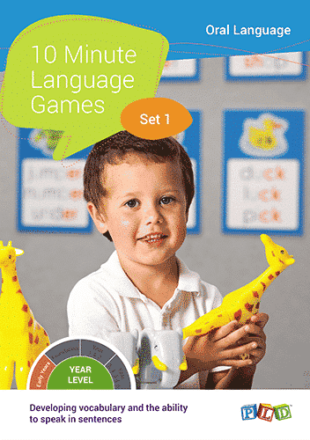
Developing vocabulary and the ability to speak in sentences.
Introduction to the Program This program is designed to provide quick, engaging activities that foster oral language development in young learners. Each game takes just 10 minutes, making it easy to incorporate into daily routines or classroom sessions. The Program Includes: 6 themes, each with 3 different language games Naming and speaking in single words Sorting and speaking in short sentences Describing and connecting several sentences together Vocabulary focused on real-life categories relevant to children Food Things you wear Farm animals Things that take you places Toys Around the home Activities tailored to 3-5 year old language development stages Other Programs within the Range: 10 Minute Language Games – Set 1 10 Minute Language Games – Set 2 Links to the Teaching Sequence Manuals This product is mentioned in the Early Years Teaching Sequence Manual
Semantic Scenes and Questioning – Set 1
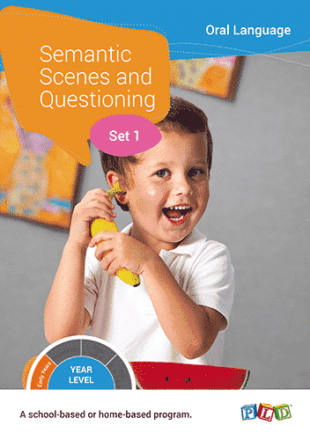
A school-based or home-based program designed to equip teachers and parents of 3-4 year old children with activities that will develop semantic knowledge.
Semantic Scenes and Questioning – Set 1 is designed to equip teachers and parents of 3-4 year old children with activities that will develop semantic knowledge. A good grasp of semantics broadens a child’s understanding of the meaning of words, which then helps them to understand what they hear or read and also helps them to express exactly what they want to say. A child who is struggling with semantics will be the child who: Can’t stay on the topic of simple story or news telling, but goes off on unrelated tangents. Takes a long time to think of particular words they want to use in conversation. Uses non specific vocabulary such as ‘that’ ‘there’ ‘this one’. Has difficulty sorting items into groups, describing them, and finding differences and similarities. Has difficulty understanding instructions that include time vocabulary such as ‘before’ ‘after’ ‘first’ etc. ‘Semantics’ refers to the meaning of sentences and words and how words relate to one another. That is, whether words belong in groups or categories together (e.g. Apples and oranges and pears are all fruit), whether they are similar to each other, or different and the features they have e.g. Size, shape and colour. Another way to think of semantics is like a network or web. Each word we speak or read has a place in this web. Each word has other words linked to it, some closely related and some distantly related. Each word belongs to several groups, some big and some small and each word has a definition that sets it apart from other words that are similar. Some words are related by the fact that they are actually opposites! All this information surrounding words is what we aim to teach young children about the vocabulary that is appropriate to their stage of development and life experience. Semantics is one facet of oral language. Given that oral language is not only a strong predictor of academic and social success but also a necessary requirement for good mental health, it is important that parents and teachers have the skills and resources needed to facilitate the development of oral language in young children. The aim of this program is to train parents and teachers to structure and facilitate developmentally appropriate semantic activities for 3 to 4 year old children. This program provides: Semantic activities and accompanying picture resources. Examples of appropriate and inadequate responses for 3-4 year old children. Techniques and strategies to implement when a child provides an inadequate answer. Features: Colour thematic picture scenes include the zoo, transport, at home, food, school, toys, Australian animals, clothes, under the sea and birthday party. Specific semantic questioning is outlined for each picture scene. Examples of appropriate and inadequate responses for 3-4 year old children. Techniques and strategies are outlined when a child provides an inadequate answer. This product is mentioned in the Early Years Teaching Sequence Manual on page 9. The programs within the range include: Semantic Scenes and Questioning – Set 1 Semantic Scenes and Questioning – Set 2
Comprehension Questions for 3 Year Olds
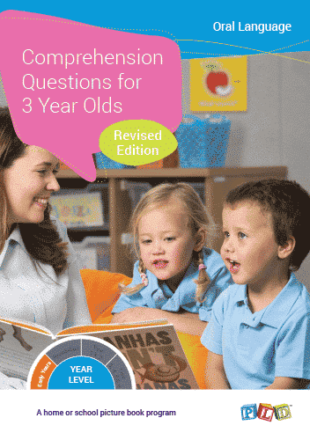
A home or school picture book program for 3 year olds.
Comprehension Questions for 3 Year Olds is a home or school resource designed to support oral language development in young children. By age 3, children should be verbal, actively engage in social interactions and understand simple, literal questions about their surroundings. This program, developed by speech pathologists, supports the development of these foundational comprehension skills using engaging picture books to ask age-appropriate questions and assess oral responses. Oral language skills are critical for social interaction and academic success. Program Includes: Picture Book Recommendations: List of developmentally appropriate Picture Book recommendations, such as 'Spot Can Count', 'The Very Hungry Caterpillar' and 'We're Going on a Bear Hunt'. 35 Question Cards for Repeated Reading Sessions: Develop blending skills through engaging visuals. Each card contains sample questions (over four days) and model answers based on each recommended picture book. Questions focus on Blank Level 1 and 2 skills, such as 'What is it?' or 'What colour is it?' Instruction Booklet: Guidance for presenting in group, class or home settings. Strategies for Success: Techniques for responding to inadequate answers. Progress Check: Two assessments to monitor comprehension skill development. Other Programs within the Range: Comprehension Questions for 3 Year Old (Mc3) Parent Training Video: 3 Year Olds Comprehension Questions for 4 Year Old (Mc4) Parent Training Video: 4 Year Olds Comprehension Questions for 5 Year Old (Mc5) Parent Training Video: 5 Year Olds Comprehension Questions for 6 and 7 Year Old (Mc6) Parent Training Video: 6 and 7 Year Olds Comprehension Questions for 8 and 9 Year Old (Mc8) Parent Training Video: 8 and 9 Year Olds The full set of Comprehension Questions Range (Mc3/4/5/6/8) Links to the Teaching Sequence Manuals: This product can be used to support the implementation of the Early Years Teaching Sequence Manual on Page 5
Developing News Telling and Narrative Skills For 4 Year Olds
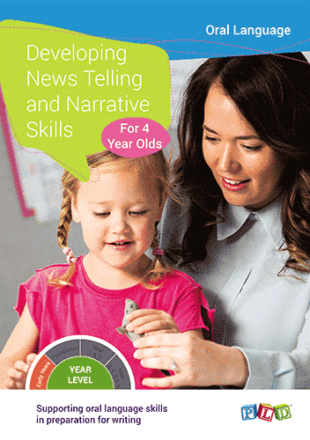
Oral language preparation for writing including show and tell, activity retells & news telling.
Initially, all four-year-olds will require support with activity retells. However if after a period of teaching they appear anxious or produce inadequate information then they may need additional support and repetition to further develop their skills. That’s why we have created Developing News Telling and Narrative Skills for 4-Year-Olds. For students with delayed language it is recommended that concrete visual aids are used to assist in the organisation and sequence of the news telling. Initially, the retells will need to occur directly after the activity, this way the materials are still present to be used as visual cues and the sequence is relatively fresh. Before commencing the activity it is recommended that the task is demonstrated step by step and explained using the language that is to be targeted in the retelling by the students. This program has been developed by Speech Pathologists for use in the classroom or home instruction, to help parents and teachers instruct 4-year-olds oral language skills in the following areas: activity retells, show and tell (or object descriptions) and event-based news. Includes: Instructions for how to implement at a whole class, small group and individual level. Pre-tests and post tests-to review progress and to determine the children who would benefit from visits to a Speech Pathologist Supporting cards and posts included Instruction manual (78 pages) 3 sets of A5 colour cards 5 x A3 colour posters The programs within the range include: Early Years Programs: Picture Book Retelling – Step 1 Developing News Telling and Narrative Skills for 4 Year Olds Foundation Programs: Picture Book Retelling – Step 2 Developing News Telling and Narrative Skills for 5 Year Olds Year 1 & 2 Program: Connecting Oral and Written Language – Step 1 Year 3, 4, 5 & 6 Program Connecting Oral and Written Language – Step 2 This product is mentioned in the Early Years Teaching Sequence Manual on page 5 & 6.
Speech Development Screen
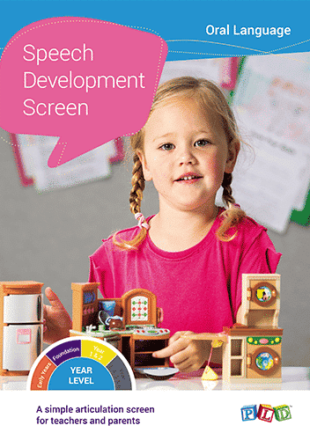
A simple articulation screen for teachers and parents.
Designed by Speech Pathologists for use in early childhood centres, schools and the home. The screen is quick and simple to administer. The screen identifies
Picture Book Recounting – Step 1
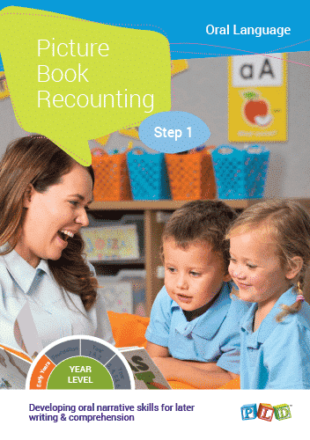
Developing oral narrative skills for later writing & comprehension.
Picture Book Retelling Step 1, is a teaching resource that attempts to break down early picture book retelling skills into simple sequential steps for teachers and parents to follow with their students and children. The program trains parents and teachers to identify where three and four year old students need to develop and strengthen their oral language skills and presents specific techniques and supports to do so. Ideal for Early Years and Pre-Primary students, Picture Book Retelling – Step 1 provides: Assessment and monitoring procedures Planning and programming supports Visual Supports Includes colour storytelling cards which assist early retelling efforts. Retell summaries for over 40 exciting and engaging picture books such as ‘Possum Magic’ By Mem Fox, ‘The Very Hungry Caterpillar’ By Eric Carle, ‘A sausage went for a walk’ By Elisha Marjid and many more! Techniques and strategies are outlined when a child provides poor retell of a story. Techniques and strategies to develop and accelerate language skills. Guidelines for structuring whole class, small group and individual activities. Comprehension questions. Retelling evaluation screen. Parent information sheets. Recommended books to read for Four Year Olds. A structured program designed by speech pathologists for teacher and parents. Storytelling can be a challenge for 3-4 year old students and teachers, however, practice is the key and the more students are exposed to the language associated with telling news or stories the more their expressive language will improve. This product is mentioned in the Early Years Teaching Sequence Manual on page 7. The programs within the range include: Early Years Programs: Picture Book Retelling – Step 1 Developing News Telling and Narrative Skills for 4 Year Olds Foundation Programs: Picture Book Retelling – Step 2 Developing News Telling and Narrative Skills for 5 Year Olds Year 1 & 2 Program: Connecting Oral and Written Language – Step 1 Year 3, 4, 5 & 6 Program Connecting Oral and Written Language – Step 2
Activity Recounts
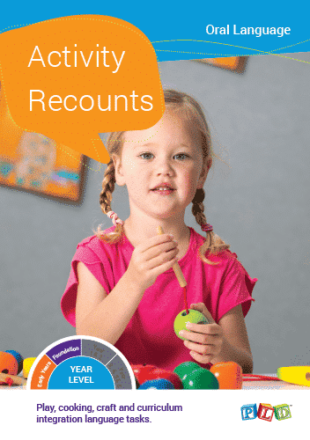
Developing language within the early years
Introduction to the Program This program is designed to develop early narrative skills in young children by encouraging them to retell simple activities and events. Through structured activities, children learn to sequence events, expand their vocabulary, and improve their ability to speak in connected sentences. The Program Includes: Activity retell posters suitable for 3-5 year olds Multiple activity retell templates and examples across 4 themes Vocabulary focused on real-life categories relevant to children Cooking Arts and Crafts Play Household Other Programs within the Range: Picture Book Retelling – Step 1 Developing News Telling and Narrative Skills for 4 Year Olds Links to the Teaching Sequence Manuals This product is mentioned in the Early Years Teaching Sequence Manual
Comprehension Questions for 4 Year Olds – School Licence

This is a PLD Whole School Licence resource.
By purchasing this licence, this program will be accessible as a digital flipbook that will be stored in your secure account on the PLD website. The program will be accessible as a digital flipbook that teachers can access on any device for as long as the licence is active. A School Licence is valid for 12 months from the date of purchase and can be shared with all staff employed at the school.
We highly recommend that either the Principal, Deputy Principal or a member of the admin team purchase the School Licence in order to manage the account and its users. For more information, visit our Whole School Licence FAQ.
A home or school picture book program for 4 Year Old students. The aim of Comprehension Questions for 4 Year olds is to train parents
Comprehension Questions for 3 to 9 Year Olds – Full Set (Variable Subscription)

This is a PLD Whole School Licence resource.
By purchasing this licence, this program will be accessible as a digital flipbook that will be stored in your secure account on the PLD website. The program will be accessible as a digital flipbook that teachers can access on any device for as long as the licence is active. A School Licence is valid for 12 months from the date of purchase and can be shared with all staff employed at the school.
We highly recommend that either the Principal, Deputy Principal or a member of the admin team purchase the School Licence in order to manage the account and its users. For more information, visit our Whole School Licence FAQ.
This is a PLD School Licence resource. By purchasing this licence, this program will be accessible as a digital flipbook that will be stored in
Comprehension Questions for 3 Year Olds – School Licence

This is a PLD Whole School Licence resource.
By purchasing this licence, this program will be accessible as a digital flipbook that will be stored in your secure account on the PLD website. The program will be accessible as a digital flipbook that teachers can access on any device for as long as the licence is active. A School Licence is valid for 12 months from the date of purchase and can be shared with all staff employed at the school.
We highly recommend that either the Principal, Deputy Principal or a member of the admin team purchase the School Licence in order to manage the account and its users. For more information, visit our Whole School Licence FAQ.
A home or school picture book program for 3 year olds. From the age of two, children should have a vocabulary of approximately 50
Teach a Child to Read in 3 steps – School Licence

This is a PLD Whole School Licence resource.
By purchasing this licence, this program will be accessible as a digital flipbook that will be stored in your secure account on the PLD website. The program will be accessible as a digital flipbook that teachers can access on any device for as long as the licence is active. A School Licence is valid for 12 months from the date of purchase and can be shared with all staff employed at the school.
We highly recommend that either the Principal, Deputy Principal or a member of the admin team purchase the School Licence in order to manage the account and its users. For more information, visit our Whole School Licence FAQ.
Targeting alphabet sounds, phonemic blending and CVC decoding Single word decoding involves two primary base skills: Visual Skills: The recognition of the alphabet symbol and
